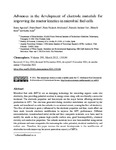Mostrar o rexistro simple do ítem
Advances in the development of electrode materials for improving the reactor kinetics in microbial fuel cells
| dc.contributor.author | Agrahari, Roma | |
| dc.contributor.author | Bayar, Büşra | |
| dc.contributor.author | Nalakath Abubackar, Haris | |
| dc.contributor.author | Giri, BS | |
| dc.contributor.author | Rene, Eldon R. | |
| dc.contributor.author | Rani, Radha | |
| dc.date.accessioned | 2022-03-04T13:42:55Z | |
| dc.date.issued | 2021-12-07 | |
| dc.identifier.citation | Agrahari, R., Bayar, B., Abubackar, H.N., Giri, B.S., Rene, E.R., Rani, R., 2022. Advances in the development of electrode materials for improving the reactor kinetics in microbial fuel cells. Chemosphere. 290, 133184. | es_ES |
| dc.identifier.issn | 0045-6535 | |
| dc.identifier.uri | http://hdl.handle.net/2183/29882 | |
| dc.description.abstract | [Abstract] Microbial fuel cells (MFCs) are an emerging technology for converting organic waste into electricity, thus providing potential solution to energy crises along with eco-friendly wastewater treatment. The electrode properties and biocatalysts are the major factors affecting electricity production in MFC. The electrons generated during microbial metabolism are captured by the anode and transferred towards the cathode via an external circuit, causing the flow of electricity. This flow of electrons is greatly influenced by the electrode properties and thus, much effort has been made towards electrode modification to improve the MFC performance. Different semiconductors, nanostructured metal oxides and their composite materials have been used to modify the anode as they possess high specific surface area, good biocompatibility, chemical stability and conductive properties. The cathode materials have also been modified using metals like platinum and nano-composites for increasing the redox potential, electrical conductivity and surface area. Therefore, this paper reviews the recent developments in the modification of electrodes towards improving the power generation capacity of MFCs. | es_ES |
| dc.description.sponsorship | The authors acknowledge the financial support received from the Science and Engineering Research Board, Department of Science and Technology (SERB-DST), India (Project Sanction no. EEQ/2017/000464). Ms. Roma Agrahari is thankful to the SERB-DST for providing financial assistance in the form of a fellowship. Büşra Bayar thanks Xunta de Galicia (Spain) for her predoctoral fellowship (ED481A-2020/226). Haris Nalakath Abubackar also thanks the Xunta de Galicia (Spain) for his postdoctoral fellowship (ED481D 2019/033). | es_ES |
| dc.description.sponsorship | India. Science and Engineering Research Board; EEQ/2017/000464 | es_ES |
| dc.description.sponsorship | Xunta de Galicia; ED481A-2020/226 | es_ES |
| dc.description.sponsorship | Xunta de Galicia; ED481D 2019/033 | es_ES |
| dc.language.iso | eng | es_ES |
| dc.publisher | Elsevier | es_ES |
| dc.relation.uri | https://doi.org/10.1016/j.chemosphere.2021.133184 | es_ES |
| dc.rights | Atribución-NoComercial-SinDerivadas 3.0 España | es_ES |
| dc.rights.uri | http://creativecommons.org/licenses/by-nc-nd/3.0/es/ | * |
| dc.subject | Microbial fuel cell | es_ES |
| dc.subject | Conductive polymers | es_ES |
| dc.subject | Carbon nanotubes | es_ES |
| dc.subject | Metal oxides | es_ES |
| dc.subject | Power density | es_ES |
| dc.title | Advances in the development of electrode materials for improving the reactor kinetics in microbial fuel cells | es_ES |
| dc.type | info:eu-repo/semantics/article | es_ES |
| dc.rights.access | info:eu-repo/semantics/embargoedAccess | es_ES |
| dc.date.embargoEndDate | 2023-12-07 | es_ES |
| dc.date.embargoLift | 2023-12-07 | |
| UDC.journalTitle | Chemosphere | es_ES |
| UDC.volume | 290 | es_ES |
| UDC.startPage | 133184 | es_ES |
Ficheiros no ítem
Este ítem aparece na(s) seguinte(s) colección(s)
-
GI-BIOENGIN- Artigos [91]






